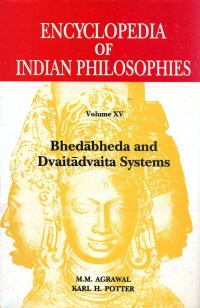
Ebook: Encyclopedia of Indian Philosophies: Bhedabheda and Dvaitadvaita Systems - v. 15
Author: Karl H. Potter M. M. Agarwal
- Year: 2013
- Publisher: Motilal Banarsidass
- Edition: 2013
- Language: English
- pdf
All too frequently the term Vedanta is used when what is meant, whether recognized or not, is Advaita Vedanta and more specifically, the philosophical system associated with Sankaracarya. Yet in fact Vedanta, literally meaning "the concluding portions of the Veda", i.e., the Upanisads, is properly used in Indian philosophy to designate those systems that take such texts as the Upanisads authoritatively along with a few others such as the Brahmasutras, alternatively known as the Vedantasutras. There are a goodly number of philosophical systems, other than Sankara's, that fall into the classification of Vedanta systems, many of them virtually unknown to most students.
The names of many of the Vedanta systems derive from their respective theories concerning the relation between Brahman, celebrated in the Upanisads as the highest principle, and Atman, the individual self. Advaita argues these are identical, non-different (abheda); Dvaita says they are completely different (bheda). Other Vedantic systems resist these extremes and argue that the relation between Brahman and self is one of identity-in-difference (bhedabheda). The best-known such system is the Visistadvaita system of Ramanuja and the Srivaisnavas, but there are many others. Here in this Volume the literature of several others of this bhedabheda persuasion-those associated with the names of Bhartr-prapanca, Bhaskara and Srikantha- are explored.
The names of many of the Vedanta systems derive from their respective theories concerning the relation between Brahman, celebrated in the Upanisads as the highest principle, and Atman, the individual self. Advaita argues these are identical, non-different (abheda); Dvaita says they are completely different (bheda). Other Vedantic systems resist these extremes and argue that the relation between Brahman and self is one of identity-in-difference (bhedabheda). The best-known such system is the Visistadvaita system of Ramanuja and the Srivaisnavas, but there are many others. Here in this Volume the literature of several others of this bhedabheda persuasion-those associated with the names of Bhartr-prapanca, Bhaskara and Srikantha- are explored.
Download the book Encyclopedia of Indian Philosophies: Bhedabheda and Dvaitadvaita Systems - v. 15 for free or read online
Continue reading on any device:

Last viewed books
Related books
{related-news}
Comments (0)